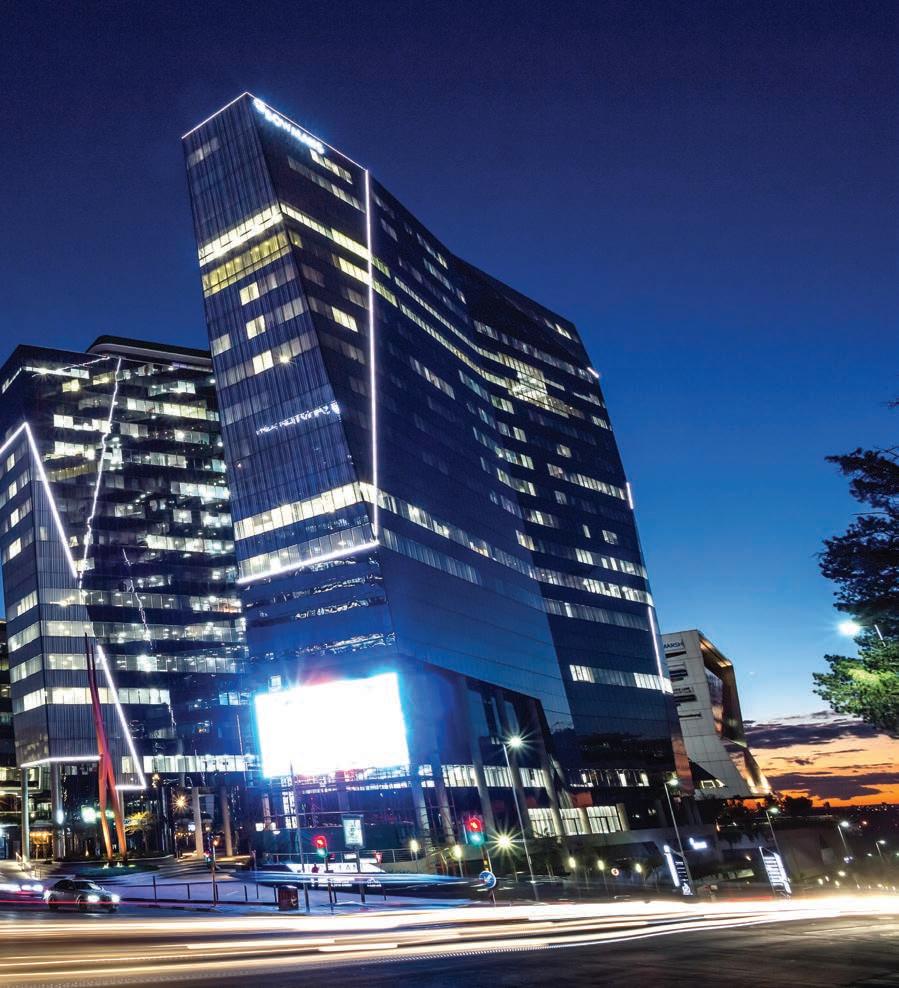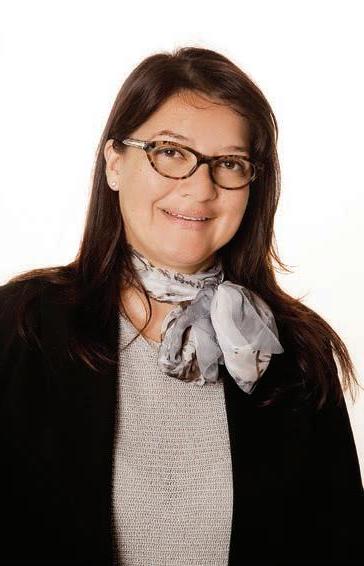
7 minute read
Is universal broadband realistic for SA?
AI learning at Tshimologong Makerspace.
Is SA Connect ready?
Successful implementation of the government’s broadband strategy is dependent on infrastructure, a mixed technology approach and education, writes Trevor Crighton
The government’s SA Connect project, aims to deliver broadband access to 90 per cent of the country’s population by the end of 2020 and access to all by 2030.
While several hundred facilities have been connected so far, the 2030 target may seem ambitious, but Professor Barry Dwolatzky, director of The Joburg Centre for Software Engineering (JCSE), remains hopeful.
“The fi rst sign that SA Connect 2 – the revised broadband strategy – will be more successful is that the Presidential Commission on the Fourth Industrial Revolution (4IR) has defi ned infrastructure as one of its major pillars. The second is that the COVID-19 pandemic has made it clear that there is a signifi cant digital divide in SA that will amplify and widen in the ‘post-COVID-19 new normal’.”
Tshimologong Makerspace co-manager Nelson Sekgota is similarly optimistic. “The internet has become a basic need, like water, food or shelter, and government has realised this. The Department of Telecommunications and Postal Services has embraced 4IR and the fact that the internet is at the heart of this revolution and is working through state-owned company Broadband Infraco to invest in network infrastructure for remote areas,” he says. “It will take a while until we reach full coverage, but these small steps will eventually get us there.” “A mixed technology strategy that fi lls in the gaps in the Barry Dwolatzky short-term and constructs a lot more fi bre in the long-term is the likely answer,” says Dwolatzky. “Mobile is not the answer, given the fact that the mobile network operators work on a purely profi t-centred economic model.

“A mixed technology strategy that fi lls in the gaps in the short-term and constructs a lot more fi bre in the long-term is the likely answer.” – Barry dwolatzky

Dr Anandini Dabas

GIG ECONOMY SKILLS
The most important gig economy skills, says Letsema consultant Dr Anandini Dabas are to: • be a relevant subject matter expert, have a unique skillset that is in demand and charge your value for it • develop an aptitude to live on contingency: companies like contract workers to aid in scaling up or scaling down at any point. Contract workers are the fi rst to be let go during a scale-down. • constantly upgrade your knowledge base and skillset so you do not become redundant with time.
The big challenge is last-mile connectivity. Technologies such as fi xed wireless can be used in some areas, while other technologies such as VSAT could be considered.”
“The poor will be left behind if they are not given access to the internet,” says Sekgota. “The internet offers many basic and employment skills relevant to today’s and future jobs. It also Nelson Sekgota offers an opportunity to connect and work online and to access social connections, e-commerce and gig jobs that the poor will miss if they are not connected.”
He believes that universal access to high-quality and relevant education will be the equaliser within our society. “The 41R is rapidly gaining ground with many jobs becoming automated through technologies such as artifi cial intelligence, the internet of things and cloud computing. Our education system needs to swiftly evolve to include courses such as coding – a basic skill necessary for many emerging technologies – in the school curriculum.”
Skilled trainers will then be required to equip newly-connected citizens to reap the benefi ts of connectivity.
THE MULTIPLIER EFFECT

The Broll Property Group pursues transformation and collaboration as the key focus in its property services strategies to enable greater economic stimulation
Investors in the commercial, industrial, and retail property space typically evaluate their properties by expected income, which, in turn, is informed by economic growth that drives demand for commercial spaces. In the current pandemic climate, this lens is skewed as all global economies are in recovery. What hasn’t changed, however, is the property sector’s multiplier effect, which underpins the economy as a whole in terms of providing other sectors with the critical means for production and economic output.
Broll Property Group views its role as the catalyst in these partnerships, yet in maintaining its own high growth rate and exceptional success is far more deeply immersed in cyclical economics.
Fay Mukaddam, shareholder and non-executive director, emphasises that Broll has evolved over the past 45-plus years – way beyond its original decree – to become an effective corporate citizen. “Our larger mandate is to be an enabler: to create jobs; promote new businesses, particularly SMMEs; upskill and develop new talent; and advance gender and racial equality, all without compromising service excellence and high-performance culture.”
These attributes, among others, serve the country best during economic downturns because each has a transformative profile. Chairman Jonathan Broll elaborates: “We recognised long ago that knowledge economies will be the foundation of every nation in Africa’s progress, which is why we have actively pursued overarching transformation as a driver in our forward-looking and ‘progressive’ property services strategies. Transformation
ADDING VALUE
Broll Property Group is the largest independently owned, pan-African commercial property services company. We offer game-changing solutions built around a culture of innovation, distinguished by service excellence and longstanding client relationships – which is why we are renowned as the ‘progressive property people’.
is an enabler that not only professionalises property markets, but also has been a differentiator for Broll because we are positively advancing change in the landscape.”
“We are agile and evolving constantly, despite and regardless of market conditions.” – Jonathan Broll, Chairman, Broll Property Group


Adv Fay Mukaddam - Broll Property Group shareholder and non-executive director

“Our larger mandate is to be an enabler: to create jobs; promote new businesses, particularly SMMEs; upskill and develop new talent; and advance gender and racial equality.” – Fay Mukaddam, shareholder and non-executive director, Broll Property Group
More than 7 000 allied service providers will attest to this, as will the 1 700 SMMEs that Broll provides work to on a sustained basis. “We contribute some R4-billion annually to third-party collaborations that assist us in meeting our client mandates,” says Broll. “We also provide systems and bespoke technologies that are independently and internationally rated to ISO standards. We are agile and evolving constantly, despite and regardless of market conditions, even launching two new service lines at the height of lockdown restrictions.”
Such agility is also risk-tolerant of economic fl uctuations and, says Broll, plays a key activator role in economic reform and sustainable job creation. Mukaddam agrees, adding: “Despite the global business world’s current need for recalibration, transformation must remain on leveraging what has been built to date, and what can be done differently in the future.
“While all Broll strategies may be about being among the best in the world, a leader in the property space, and aligning the ‘Brollie’ culture with local partnerships, we never assume superiority. These types of collaborations enable an energised growth of local talent, and have added extra kudos to our Level 1 B-bBEE status, which, incidentally, was achieved during lockdown,” says Mukaddam.
It is important, however, to ensure that transformation doesn’t take place only in terms of race and gender. “Diversity, regardless of the form it takes, can only be amplifi ed by changing behaviours and actions. This runs in our veins; it’s the ‘Brollie’ way. If a company and its teams, and by infl uence its collaborators, are holistically and robustly embracing transformation, an entity or individual becomes a serious contributor to GDP.” she adds.
Mukaddam also highlights that Broll has an empathetic leadership that translates into the business being well anchored within its stakeholder ecosystem. “This has manifested in Broll being the preferred partner for mitigating risks that might otherwise be uneconomic for all.”
For more information:
info@broll.com www.broll.com











